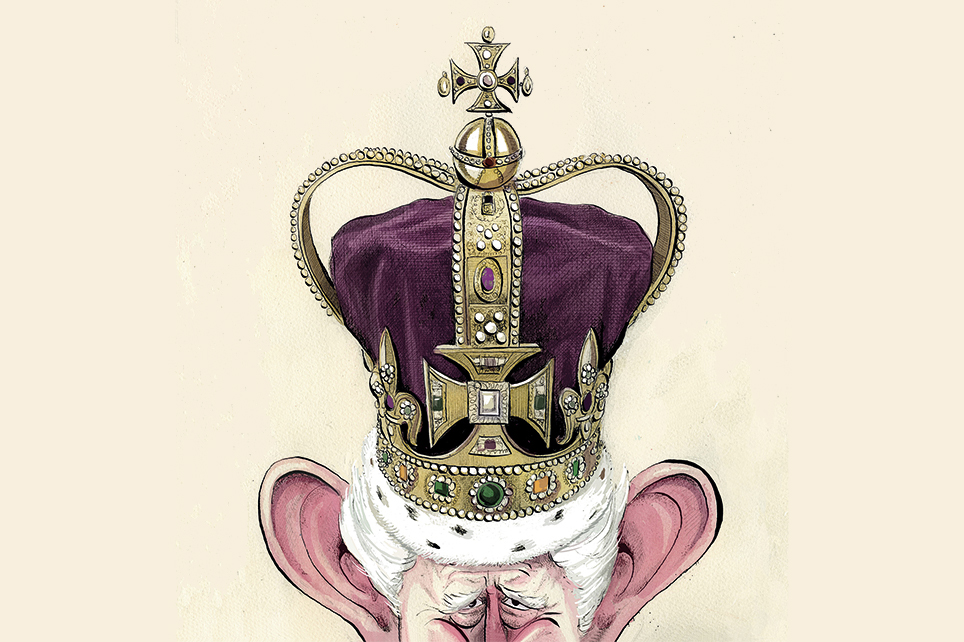The last time a monarch acceded to the throne, her subjects had to wait ten months to hear her speak. Elizabeth II was only twenty-five and had her whole adult life before her. The public were more patient in those days and the media was an entirely different creature, moving at a slower pace.
It was not until Christmas Day 1952 that the British heard their Queen (by now twenty-six) begin: “Each Christmas, at this time, my beloved father broadcast a message to his people in all parts of the world. Today I am doing this to you, who are now my people…”
In 2022, we had to wait all of twenty-four hours before hearing Charles III outline his vision for his reign. He did so in a speech which, by common consent, hit the right note (a YouGov poll days later gave it a 94 percent approval rating). Since then, he has maintained a similarly frantic pace, whether in terms of new coinage, new stamps or, indeed, coronation arrangements.
The King is at heart a great traditionalist, but he is also determined to be different
There has been some grumbling about the last-minute nature of the preparations for Saturday’s event, not to mention the guest list — and outbreaks of FOMO among those previously unfamiliar with the condition. Following a ration of just fifty seats apiece for the Lords and Commons and a near wipe-out of the hereditary peerage, the “fear of missing out” has reached the highest echelons. Traditionalists mutter privately about the King and his master of ceremonies, the Earl Marshal, “going woke.” They point to the 75 percent reduction in seating capacity compared with 1953 and a very different dress code (morning dress or lounge suits this time, vs the coronation robes or breeches and velvet court dress of yesteryear).
Even among those who have made the cut, there has been bellyaching. There has been much amusement at the persistent efforts of one very grand hereditary peer who not only wants to wear his ancestral coronation robes and coronet but to arrive in the family horse-drawn coach accompanied by a page. He has been told, in no uncertain terms, to dress like everyone else, come by car or on foot (minus page) and be grateful that he is not having to watch on telly like most of the nobility.
This is not a case of regal wokery. It simply reflects the fact that ministers and Whitehall are calling many of the shots, on the basis that they are footing the bill. So, for example, the ancient Court of Claims, the panel of peers and senior judges appointed to decide who should be permitted to perform certain roles at each coronation, has been replaced by a “coronation claims office” made up of civil servants. It is they who have trimmed the ermine and shortened the processional route. In other words, don’t blame the Earl Marshal.
Of course, everything has received the nod from the King. He is at heart a great traditionalist, but he is also determined to be different. He accepts that a twenty-first-century coronation must look and be of its time. The last one was entirely white and Anglican (with a walk-on part for the Moderator of the Church of Scotland). The Queen herself accepted that those days were long gone when she faced down Church of England traditionalists in the 1970s and pushed through a new multifaith annual service for the Commonwealth at Westminster Abbey. No one would call that “woke.”
Seven months into Charles III’s reign, we have a clearer view of the ways in which he is going to be different. It is not that he is impatient, but he certainly appears to be in a hurry. This is not surprising given that he will be seventy-five this year and is not giving much thought to jubilees.
In the immediate aftermath of his accession, there was a simplistic narrative that he would suddenly, overnight, have to button his lip. Constitutional experts confidently proclaimed that he would have to bury opinions which he had been voicing for decades. Commentators were quick to point to his non-appearance at the COP27 climate change summit in Egypt, held two months after the Queen’s death. Here, they said, was proof that the erstwhile prince of environmentalism had either been neutered as sovereign or was being placed under house arrest by the Conservative government.
Key to his contentment has been the way in which the Queen Consort has embraced her role
In fact, though the King was acting on ministerial advice, he was quite content not to go. Great thought goes into the first overseas visit by a new monarch. A new US president does the same. Squeezing into a summit alongside more than 100 world leaders to deliver a diluted version of what he said just one year before at COP26 in Glasgow would have been a huge waste of a diplomatic trump card. His COP credentials were beyond reproach anyway. It was the then Prince of Wales who, in 1991, held a conference on board the royal yacht in Brazil, helping to pave the way for the very first COP. I was in the room in Glasgow in 2021 when President Biden hugged him, saying: “If it wasn’t for you, we wouldn’t be here.”
However, being king has certainly not stopped Charles from making these same points in different ways. He not only held a Buckingham Palace reception on the eve of COP27 for all those heading off to Egypt, but just three months later I watched him holding a “reception in support of action on global biodiversity” at Buckingham Palace. Those who warned that the King would not be able to “meddle” in politics as monarch had completely missed the point. Here was “meddling” of a different sort, much to the delight of all the British government ministers at the same event. They had just been staging an international biodiversity conference over the road at Lancaster House. Initial take-up had been unexceptional until the King offered to host a palace reception for those attending the conference — at which point, to the delight of politicians and officials, both the numbers and the caliber of delegates shot up. The King did not say a word in public. He did not need to.
Back in his princely days, I asked him what would happen to the “meddling” when he became King. “I wouldn’t call it meddling. I would call it mobilizing,” he explained, adding: “I might still have some convening power that could be brought to use for various purposes actually.” Here was a clear illustration of the convener King in action.
I saw it time and again during his debut state visit the other day, to Germany (after riot-torn France canceled at the eleventh hour). At the most formal level, his speech to the Bundestag correctly echoed all the points the British government wanted him to make, from postwar reconciliation to shared culture as well as the fight against climate change. Yet he did it in his own words. His was the first address to the Bundestag by a foreign head of state in German and it drew rave reviews. As Germany’s bestselling paper, Bild, declared: “He came, he spoke, he inspired.” Those who feared a draining away of the monarchy’s soft-power potential could park those fears.
In between the big events, though, the tour was full of personal “convening’”touches. No sooner had the official state welcome finished (the first to be held in front of the Brandenburg Gate) than the King was getting stuck into his first engagement. It was not one the late Queen would have countenanced. On her last state visit to Berlin, in 2015, her first engagement had been a boat trip down the river Spree. For the King, it was a meeting of the “Berlin Energy Transition Dialogue.”
Those who know him well have detected something different about the King himself. He is, quite simply, happier. This might seem odd in someone who, having just buried his mother, was assailed by a six-part TV broadside and then an explosive memoir from his younger son, not to mention a running media debate on the future of the monarchy. Yet he is very clearly enjoying his new role.
“As monarch, you are treated differently. Your engagements receive more attention. You are taken more seriously because you are in charge. Plus, you have a lot more to do,” says a member of his team. “You can’t sit around worrying what Harry might say next when you have a Christmas broadcast to write.”
Key to his contentment has been the way in which the Queen Consort has embraced her role, injecting a blend of humor and common sense into each engagement while never seeking to be the center of attention. Like Prince Philip before her, she takes a no-nonsense, eye-on-the-clock approach to the role of consort. If the King is dawdling, a gentle tap of handbag on back usually does the trick.
Another new aspect which has surprised even close friends is the fact that the King spends more and more time at Windsor and at Birkhall, at the expense of trusty old Highgrove. His love of the second-string residence on the Balmoral estate is reflected in the fact that staff now refer to Birkhall as “the marital home.” Whenever the couple need to decompress, as they did in the days after the Queen’s funeral, they head for Deeside. As for Windsor, officials had always imagined that the din of air traffic and the constant stream of tourists would mean that the King only used it for official events. After all, he spent precious little time there as Prince of Wales.
However, he has always adored the treasures of the Royal Collection and of the Royal Library, which stretches out below the state apartments. Having appointed himself Ranger of the Great Park, in succession to Prince Philip, who held the post longer than anyone in history, he is also taking a very keen interest in all that happens on this most ancient of the royal estates.
Elsewhere, he has big plans for the grounds of both Buckingham Palace and Sandringham. For one area where monarchs can meddle to their heart’s content is in the garden. Having devoted so much of his time — and, indeed, his soul — to transforming the landscape at Highgrove, the horizon has suddenly expanded very considerably.
So much to do. Yet, ever-present if unspoken, is that race against the clock. He made it clear in that first address on the evening after his mother’s death: “As the Queen herself did with such unswerving devotion, I too now solemnly pledge myself, throughout the remaining time God grants me…”
It explains another difference between this reign and the last. It is one which can sometimes upset the hosts of awaydays and state visits as they search in vain for a breather in the royal itinerary. The King, as his staff know only too well, does not do lunch.
This article was originally published in The Spectator’s UK magazine. Subscribe to the World edition here.

























